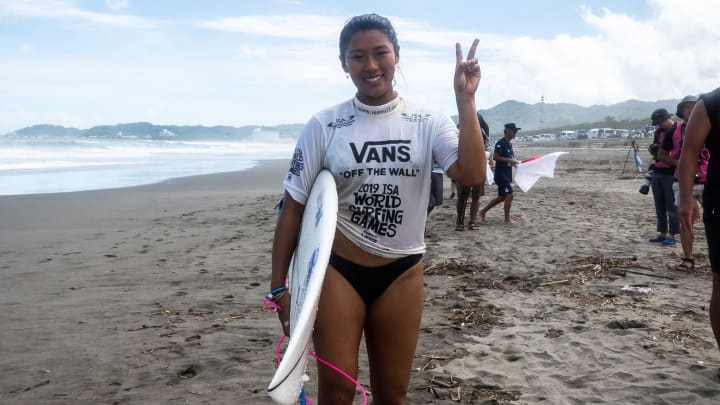
What It Means to Be From Two Places at Once
日本語版はこちら
If you were ever on the North Shore of Oahu, let’s say, 20 years ago, you might have seen a little girl sitting on the beach.
This little girl would have been around three years old. She was wearing floaties on her arms and pink goggles strapped tight against her head — and she was doing the strangest thing. She would sit right on the shore break, right where the waves would crash, and she would let the water come rushing in and swallow her up. Then, like magic, she’d pop up a few yards away from where she disappeared, with a big smile on her face and sand covering her from head to toe.
That little girl was me.
And I was in the middle of what you might call … a tradition. But that might be a stretch. I was just a kid being a kid. I don’t even remember doing that, but my dad tells me about it from time to time.
Surfing was just always there.
- Mahina Maeda
“Mahina, did I ever tell you about when you used to sit in the shore break and —”
“Yes, Dad!”
I might not remember in my mind, but my soul remembers it.
That’s where my connection with the ocean began. My sister didn’t love the ocean as much as I did. I think it’s natural for a lot of young kids to have a fear of water — but for me, I don’t know … it really just felt like that was where I belonged. The elementary school I went to is right across the street from Pipeline, one of the North Shore’s most iconic surf spots. Every day before class I’d look across Kamehameha Highway and see all the surfers heading out for early morning sessions, and after school ended I’d see them as I biked home.
Surfing was just always there.
If you grew up in Hawaii — and if you grew up on the North Shore — surfing is so much more than a sport.
It’s an expression of who we are.
So, I’m going to do my best to explain some of the history of Hawaii for you here. I’ll keep it brief. But, for real, I would recommend you do some of your own research before your next vacation here.
You see, back in the 1700s when the Western world first made contact with Hawaii, there were all these Protestant missionaries who set up sugar plantations. And they wanted immigrants from all over Southeast Asia and — native Hawaiians — to work as slaves. Those missionaries, and so many of the Westerners did terrible, terrible things to the natives. It really breaks my heart, and … honestly? It pisses me off when I think about it. There’s just this pain in my chest, even now, talking about it.
And among the countless, horrific atrocities committed by the ruling immigrants and missionaries was the attempt to strip Hawaiians of their culture. This included a ban on teaching their language, a restriction on all traditional practices like hula dancing and, of course, surfing.
Over the years, after hundreds of thousands of Hawaiians died from mistreatment and from disease brought by the Westerners, and the Republic of Hawaii was formed, surfing returned in Waikiki.
And now, anyone who is from here — who knows what it means to be Hawaiian — I think they know what it means when we get on a surfboard to compete.
It’s just different if you’re from here, that’s all it is. Just ... different.
Anyone who is from here — who knows what it means to be Hawaiian — I think they know what it means when we get on a surfboard to compete.
- Mahina Maeda
I didn’t know all that when I was just a little girl getting eaten up by the waves. All I knew was that I loved the water. And that love for water turned into a love for surfing pretty quick. My dad and I would go out on one of those tandem surfboards when I was four or five, and I’ll be honest, I don’t remember a whole lot from it. But you know what I do remember?
It was just so much fun.
Being out on the ocean, Dad right behind me, sun beating down on us and the sound of waves crashing. It was just the best. Truly.
My mom and dad — Hitomi and Yasuo — are both Japanese. They met in Hawaii after getting their green cards and moving here for work. My sister and I grew up in a really traditional Japanese home. Lots of the customs my parents grew up with were passed down to the two of us. But even from a young age, I felt like I had this … like I had two identities. At home, I felt Japanese. But all my friends at school were like, super American. Most of them were white and into just, you know, regular American kid stuff. And so was I, mostly. And my parents didn’t care about that or anything. It was just like … I knew I was different in a way.
It wasn’t until I was 10 and I started competing in surfing that I began to understand what that feeling really meant. One of the things in Japanese culture that is so important to me and my family is the way we respect the elders in our community. There’s just a level of admiration for them that doesn’t quite exist in American culture. But in Hawaii, especially on the North Shore, it’s actually the same thing. I’d call lots of people “auntie” or “uncle” growing up, even if we weren’t related by blood. Because our community had instilled that in us. And it’s those people, my North Shore family, that have helped me get to this point in my career.
I'm 23 years old now, and I’m an Olympian.
That girl getting run over by waves all those years ago, she’s an Olympian.
But when you see me competing in Tokyo, it won’t be with an American flag by name. It will be a Japanese one. And I want to explain why.
Five years ago, I wanted to quit surfing. I was just having a bad time. You know how when you’re 18 and all you want to do is move out and go do your own thing? That was me. But in Japanese culture you’re not supposed to move out. And I just felt … stuck. I was stuck with my surfing, too. I wasn’t progressing like I had hoped. Actually, in Japan, they have a word for what I was going through: Yakudoshi. It basically means like, “the bad years.” And for girls that’s usually around … yeah, 18 years old. It stinks. Do not recommend it. I was just caught in this rut. I was feeling those two identities — almost two versions of me, really — and it was like they were fighting each other off.
And so I quit surfing for six months. I moved out of my home, but stayed on Oahu. I paid my own rent like an adult. I just sort of … let myself come to the answer I was looking for.
But life is funny. During that time I met Kid Peligro, who is a trainer, and basically, he just helped me find my passion again. I consider him a second dad. It was around that time, too, that surfing was announced for the 2020 Olympic Games. I remember seeing that and thinking, That’s cool, but like, not for me. I didn’t have my Hawaiian sponsors anymore and I just wasn’t ready to commit to that.
When you see me competing in Tokyo, it won’t be with an American flag by name. It will be a Japanese one.
- Mahina Maeda
But as I talked to Kid more, he just helped to guide me through a lot of the crap in my head. All my subconscious fears — of failure, of disappointment. He just made me see myself in a different light. It wasn’t anything he said, necessarily, but more the way he allowed me to view who I was and what I was capable of through training.
That’s when I realized I needed to try to get back to the surfer I knew I could be. I’ve always known I’ve had potential. The surfing world saw it when I won my junior world titles. My aunties and uncles on the North Shore saw it. My parents saw it. They had all given so much to help me get to where I was. I owed it to them.
So I decided to connect with a part of myself that I had neglected in a way when I moved out.
I’m from the North Shore.
That’s my home.
It will always be my home.
I’m Hawaiian.
But I’m also Japanese.
I’m more than one flag, one country, one language.
I’m me.
And for me, the route to becoming the person I always wanted to be was to surf under the Japanese flag. So I made the decision to switch a few years ago, knowing I would have a chance to possibly represent Japan at the Olympics. Being able to represent Japan … it was an emotional and spiritual choice as much as anything else. I felt renewed by the opportunity to connect with my Japanese roots — to continue to learn about myself.
I wanted to step out of my comfort zone. I made the decision to live part-time in Chigasaki, Japan, over the past two seasons. The pandemic made that difficult so I ended up spending a lot of time at home on the North Shore. But I wanted to get Japanese sponsors and really become a part of the Japanese surfing community.
I’m more than one flag, one country, one language. I’m me.
- Mahina Maeda
We had a two-story house growing up and my parents would rent out the bottom floor to visiting surfers, including lots from Japan. I always knew how passionate the country is about surfing. But to be over there, to see it first-hand, it was just really special. Surfing was always so … personal to me. It was our thing on the North Shore. Not that I ever thought that it was just for us. But just that it meant a lot to me. And to see little boys and girls diving into the water in Japan, I don’t know, it made me feel not so far from home.
This year, when I qualified for the Japanese team, I thought of them.
I hope to represent them as best as I can.
To be from two places at once is to embody the spirit of those places in the way you act, in the way you carry yourself. It’s to be proud of who you are. I take a lot of inspiration from what Naomi Osaka has done in tennis, and how she represents both Japanese and American heritage. She is a role model for me, and I hope I can be the same for someone out there, too. That’s all I want.
So whatever happens this week in Japan, I know I’ll have made the right choice. Because I’m here, and I’m following my heart. And if a big wave gets a hold of me, and I disappear below the water for a second, I know I’ll pop back up, still me — still Mahina.
Mahina from Hawaii. From Japan. From the North Shore.

